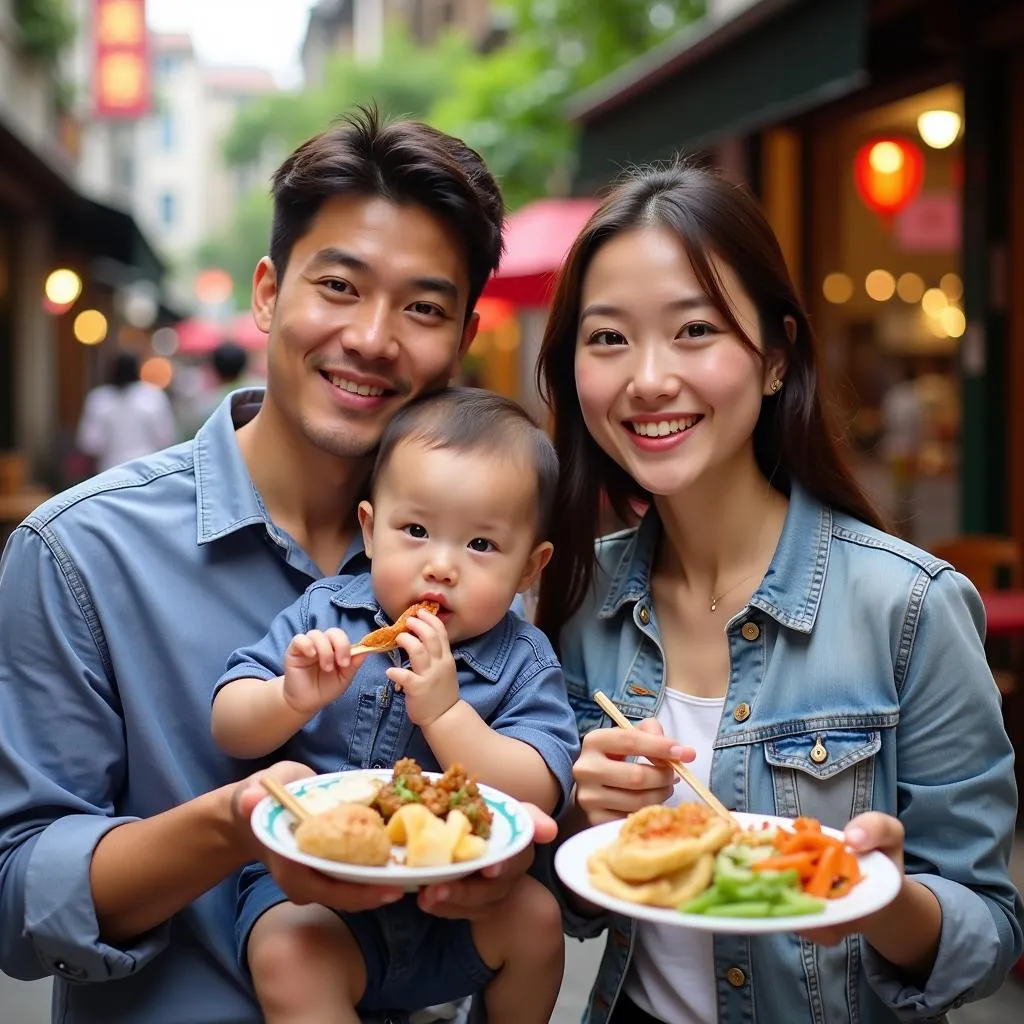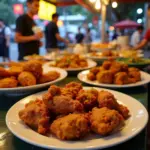Stepping into the world of solid foods with your 8-month-old is an exciting milestone. It’s a time of discovery for your little one, with new flavors and textures to explore. But it can also be a time of uncertainty for parents. What can 8-month-old babies eat? What are the best first foods? And how much should they be eating?
Remember the saying, “The child’s stomach is as small as a sparrow’s”? In Vietnam, this age-old wisdom reminds us of the delicate digestive system of babies. Let’s embark on this culinary journey together, navigating the world of baby food with confidence and joy.
Exploring New Tastes: A World of Flavors for Your Little One
By 8 months, your baby is likely showing signs of readiness for solid foods. They can sit up with support, have good head control, and may even be reaching for food. This is the perfect time to introduce a variety of nutritious options to support their growth and development.
First Foods: Starting Slow and Simple
When introducing solids, it’s best to start with single-ingredient purées. Some great options include:
- Fruits: Well-ripened bananas, avocados, cooked and pureed apples, pears, and peaches.
- Vegetables: Sweet potatoes, carrots, squash, and green beans (all cooked and pureed).
- Grains: Iron-fortified infant cereal (rice, oatmeal, or barley).
Start with a small amount, about 1-2 teaspoons, and gradually increase the quantity as your baby gets used to the texture and flavor. Offer one new food at a time, waiting a few days to introduce another, to watch for any potential allergies.
Expanding the Menu: A Variety is Key
As your baby masters the art of swallowing purees, you can gradually introduce thicker textures. Try mashed or finely chopped foods, like:
- Fruits: Soft berries (cut into small pieces to prevent choking), mango, papaya, and melon.
- Vegetables: Broccoli, cauliflower, peas, and sweet potatoes (steamed and mashed).
- Proteins: Cooked and finely shredded chicken, fish, tofu, and well-cooked eggs (ensure there are no allergies).
Remember, every baby is different. Some may take to new foods immediately, while others may need some encouragement. Patience and persistence are key!
 Baby eating first solids
Baby eating first solids
Navigating Food Allergies: A Cautious Approach
Introducing new foods can be exciting, but it’s important to be mindful of potential allergies. Common allergenic foods include:
- Cow’s milk
- Eggs
- Peanuts
- Tree nuts
- Soy
- Wheat
- Fish
- Shellfish
Introduce these foods one at a time and watch for any reactions, such as hives, swelling, or difficulty breathing. If you notice any of these symptoms, contact your pediatrician immediately.
Traditional Vietnamese Wisdom: A Holistic Approach to Feeding
In Vietnamese culture, food is not just about nourishment, it’s about love and connection. We believe in feeding our babies “the essence of life” through wholesome, home-cooked meals. “Cháo” – a savory rice porridge – is a staple in Vietnamese baby food, often cooked with bone broth, vegetables, and minced meat for added flavor and nutrition.
As Dr. Nguyen Thi Hoa, a renowned pediatrician in Hanoi, suggests in her book “Nurturing Little Tummies: A Vietnamese Guide to Baby Food,” “Introducing a variety of tastes and textures from a young age can help develop a healthy palate and reduce picky eating later on.”
 Vietnamese family eating chao
Vietnamese family eating chao
Mealtime Tips: Making It Enjoyable for Everyone
Mealtime should be a positive experience for both you and your baby. Here are some tips to make it enjoyable:
- Establish a routine: Offer meals around the same time each day.
- Create a calm environment: Turn off distractions like TV or phones.
- Be patient: Don’t force your baby to eat if they’re not hungry.
- Make it fun: Engage with your baby, make eye contact, and smile.
Safety First: Important Considerations for Baby Food
- Always supervise your baby while they’re eating.
- Cut food into small pieces to prevent choking hazards.
- Avoid honey for babies under one year old.
- Introduce new foods gradually and watch for allergies.
- Consult with your pediatrician for personalized advice.
Planning a Trip to Hanoi with Your Little One?
TRAVELCAR makes exploring Hanoi with your baby a breeze. We offer a range of services to make your trip comfortable and convenient, including:
- Airport transfers: Arrive at Noi Bai International Airport (HAN) hassle-free with our reliable airport transfer service.
- Car rentals: Explore the city at your own pace with our selection of family-friendly vehicles, including spacious 16-seater, 29-seater, and 45-seater buses.
- Private tours: Discover Hanoi’s hidden gems with a personalized itinerary designed to suit your family’s needs.
For all your travel needs in Hanoi, contact TRAVELCAR at:
Phone: 0372960696
Email: [email protected]
Address: 260 Cau Giay, Hanoi
Our dedicated team is available 24/7 to assist you.
 Hanoi family street food tour
Hanoi family street food tour
Embracing the Journey: A World of Flavor Awaits
Feeding your 8-month-old is a journey filled with discovery and delight. By following these tips and listening to your baby’s cues, you can help them develop healthy eating habits that will last a lifetime. Remember, patience, persistence, and a dash of Vietnamese wisdom will go a long way in making this a memorable experience for both you and your little foodie.
We encourage you to share your experiences and tips for feeding 8-month-old babies in the comments below. What are your little one’s favorite foods? Do you have any special recipes to share?

